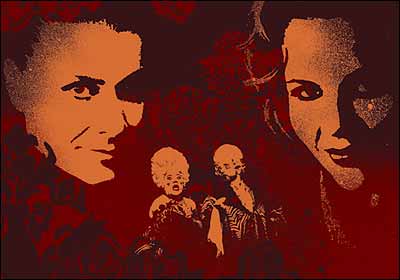
When a classical superstar manages to land a big record deal these days, it’s a major—and rare—event, and, as rock bands have done for decades, he or she often goes on the road. Take Cecilia Bartoli, who sold out Carnegie Hall last week with a concert that more or less duplicated her new Decca recital disc, Opera Proibita (“Forbidden Opera”). If the whole project sounds as if it were marketed by P. T. Barnum himself, so be it. Bartoli is a mezzo worth hyping, and the recording is quite accurately advertised. All the composers on the disc—Handel, Alessandro Scarlatti, and Antonio Caldara—were active in Rome 300 years ago, when the prudish Pope Clement XI placed a ban on public opera performance, causing composers to turn to oratorios and private patronage.
Most of those scores, even those by Handel, are seldom performed, so Bartoli did us a favor. And exciting discoveries they turn out to be, thrilling operatic arias in all but name: virtuosic, melodically ravishing, full of subtle erotic tension, and flattering to voices able to cope with their technical demands. From her gorgeously floated soft singing to her brilliantly articulated coloratura, Bartoli had the audience hanging on every note. Her over-the-top twitches, beating fists, and flying ponytail, apparently intended as cues for the conductorless Orchestra La Scintilla of Zürich Opera, were a bit much, but Bartoli is one of the few classical artists with the support to do as she pleases. Give credit to a singer who invites fans into her adventurous musical world rather than pandering with cheesy crossovers.
That’s a tough move for singers to avoid. Even Renée Fleming will go slumming while waiting for Decca, her label, to make a complete opera. By some miracle, Richard Strauss’s Daphne got the go-ahead, and last week the soprano, conductor Semyon Bychkov, the WDR Symphony Orchestra Cologne, and most of the cast arrived at Carnegie Hall to plug the CD. It baffles me why some of Fleming’s cheerleaders are awed by her choice of “risk-taking” rarities like Daphne: The opera is no longer a curiosity, and the title role is rather less exacting than Elektra, Ariadne, Salome, and many Strauss heroines that would be a major stretch for Fleming. Daphne seems tailor-made for her creamy lyric soprano and the vulnerability she creates at her best.
And she was definitely in top form at Carnegie, duplicating the CD while letting her voice and musical instincts flow naturally. The opera’s truly tough role is Apollo, and in all my Daphne sightings, no tenor has managed this stratospheric part with more grace and tonal security than Johan Botha. At the other end of the octave, contralto Anna Larsson got off several astonishing low E-flats as Gaia, and Roberto Saccà’s mellifluous light tenor served him well as Leukippos. Best of all, the orchestra played like a dream for Bychkov, making Strauss’s most painfully beautiful score sing eloquently in every measure.
Perhaps the most unexpected record tie-in is Richard Rodney Bennett’s The Mines of Sulphur, now at City Opera. This 1965 gothic tale of plague, apparitions, and murder on the moors was such a hit when revived at Glimmerglass in 2004 that the British label Chandos decided to record the production. That in turn may have helped it make the leap to the State Theater, where it’s as creepy as ever. Listening to the disc, where one can focus more intently on the music itself, allows one to savor Bennett’s accessible serial idiom even more readily, with its biting harmonic twists and eerie orchestral colors—atmospheric effects not entirely unrelated to the advanced composition techniques he sneaks into film scores like Murder on the Orient Express.
Cecilia Bartoli
Carnegie Hall
October 19.
Daphne
Richard Strauss
Renée Fleming and the WDR Symphony Orchestra Cologne
Carnegie Hall
October 15.
The Mines of Sulphur
Richard Rodney Bennett
New York City Opera
Through November 5.